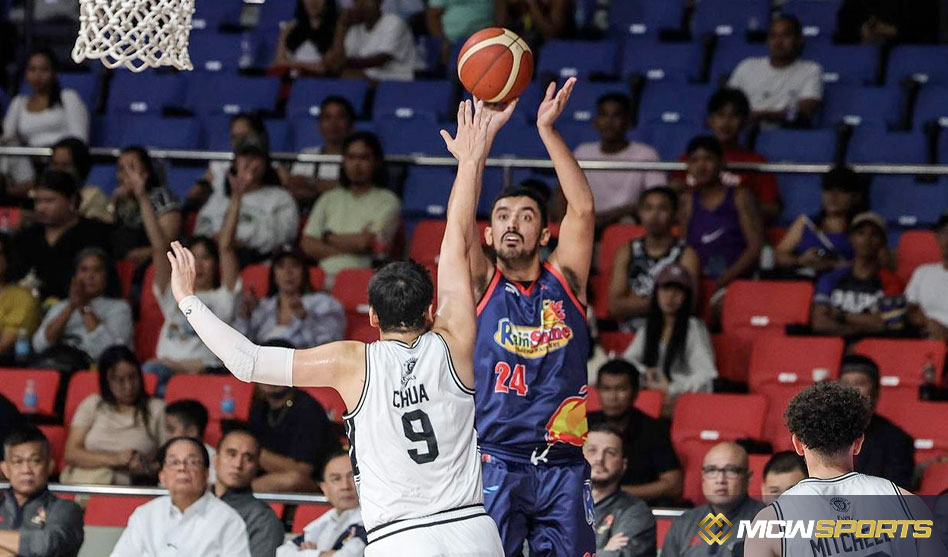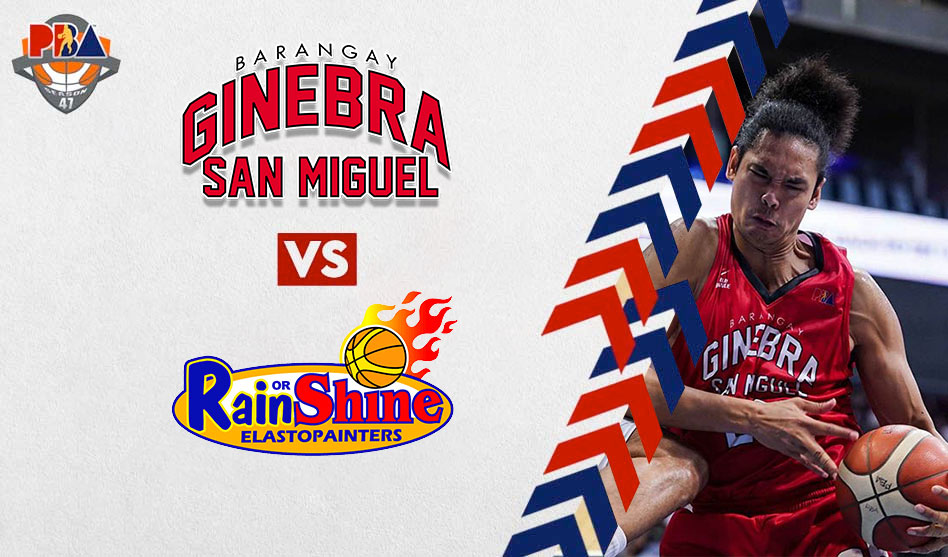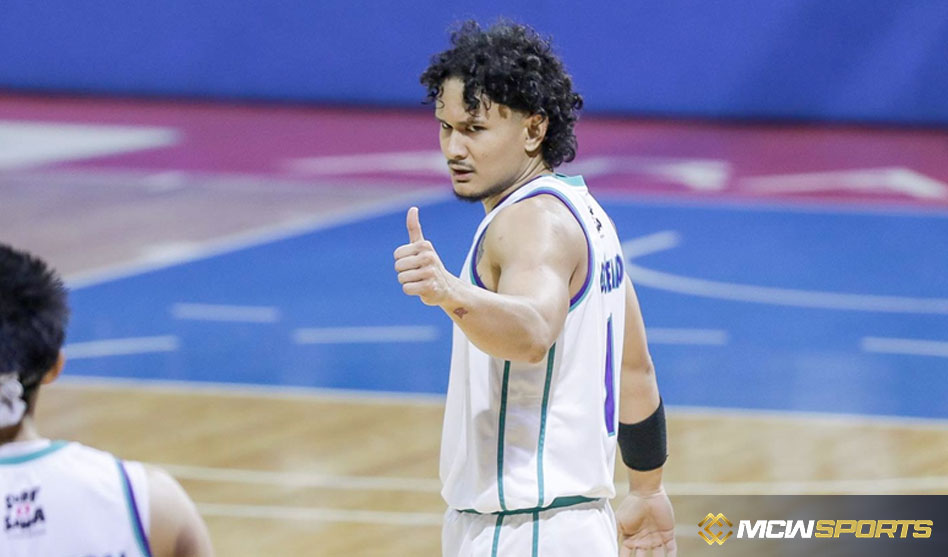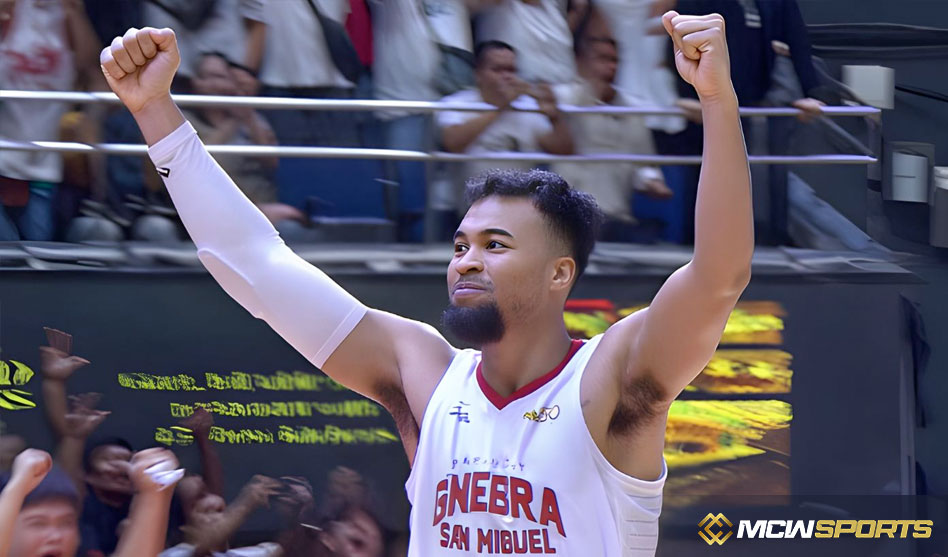On the hardcourt, Ginebra’s Japeth Aguilar and Rain or Shine’s Nick Demusis are seen in a defensive bind.
After a scare during Barangay Ginebra’s season opening against Blackwater last Sunday, Japeth Aguilar confessed he is being ‘extra cautious’ with his freshly healed left leg injury.
The ‘6 foot and 9’ high flyer stated he is controlling his calf after experiencing soreness during Ginebra’s first win of the season against Blackwater, where he made the game’s most significant basket.
The calf injury is the same one that held Aguilar out of a few games during the Governors’ Cup playoffs in 2021-2022.
“I just want to be extra careful,” Aguilar stated. “Parang na-feel ko na it’s coming back, ‘yung nagging pain. I requested for a check-up and really, management lang talaga. Hindi na rin tayo bumabata [I feel like it’s coming back, the nagging pain. I requested for a check-up and really, it’s the management, we are not getting younger]”
“I really have to be disciplined off the court actually. Kailangan talagang alagaan [we really need to take care] and make sure I’m healthy,” Aguilar added.
Aguilar stated that he is now placing ice on the calf on a regular basis, which he was not doing previously.
Aguilar mentioned “It’s something new to me. Before, after practice, I go home, don’t stretch, don’t ice. But now, we really need to manage,”
The extra attention paid well, as Aguilar revealed he was pain-free versus Rain or Shine on Wednesday. In Ginebra’s 90-85 triumph, Aguilar had 23 points, seven rebounds, and two blocks, as well as a left-handed alley-oop slam off a pass from LA Tenorio.
Ginebra coach Tim Cone said the team is avoiding the possibility of Aguilar missing games due to his calf injury, citing how his absences harmed the team during last conference’s playoff run.
“If it flares, then yesCone spoke on the prospect of Aguilar missing games. “Hopefully, the management that we do keeps him prepared for every game. That’s the hope.”
“If he starts to feel it, he needs to cut back on his minutes.” If he’s in a terrible mood, he might have to miss a few games. But it is precisely what we are attempting to avoid.
“That’s what happened to us in the conference finals last year, and it showed. We were down 2-1 without him, and when he came back, we won three straight games. The value is certainly there,” Cone said.
Aguilar’s ailment, according to Cone, will be managed by the training staff. “As a training staff, they understand the importance of being cautious around Japeth.” They are aware that they must prepare them in that specific location of his physique. That is something they must plan for. There is a lot of preparation that goes into it in terms of icing, massage, stretching, and other things.
“It takes a lot of discipline to want to do that. Sometimes, it starts feeling good. You just go ‘OK, never mind I don’t need to do it today.’ Then, boom, it’s back. It’s that everyday thing that he has to do every time,” Cone stated.
On calf injuries
Adults who engage in activities that demand rapid accelerations and decelerations, as well as rapid changes in direction, may develop a calf strain. Basketball and tennis are examples of such sports. It is caused by an injury to one or more of the lower leg muscles, such as the gastrocnemius, soleus, or plantaris.
Pain in the back of the lower leg or behind the knee is the most prevalent symptom. Although the damage is usually acute, persistent strains can occur. Patients often experience a tearing or popping sensation in the affected region, typically while pushing off the affected foot with the ankle bent upward and the knee straight. Patients may be unable to walk and notice bruising around and below the area of pain.
Steps to preventing calf injury
1. Before you play basketball, warm up your muscles. Basketball necessitates fast calf muscle movements, and cold muscles are more prone to ripping. Before playing, a 10-minute brisk walk or mild jog warms up your muscles and helps your calves adjust to the physical stress of basketball. If you’re going to play in the cold, make sure you’re dressed warmly.
2. Calves should receive strength training. Muscle fatigue is caused by improper conditioning, which reduces muscle endurance. Basketball drills put too much stress on the calf muscle when muscles are exhausted. Calf raises are a straightforward and efficient way to strengthen your calves. Stand with your feet flat on the floor and about 6 inches apart to complete calf lifts. For support, grab a wall or a railing. Raise your body to your toes on the balls of your feet and hold for five seconds before lowering your heel to the ground. Repeat the up-and-down motion 15 times more. By using dumbbells or a barbell, you can enhance the intensity.
3. After a game of basketball, stretch. Stretching induces muscle stress by causing minute microscopic tears in the muscle. Stretching the tear and recovery cycle helps to enhance flexibility, but only if stretches are done after basketball rather than before. Stretching should never be followed by vigorous or intensive physical activity since it stimulates the muscle. This raises the risk of muscle strain. Place your palms flat on a wall at shoulder height to stretch your calf. Maintain a straight back and arms. In a split stance, step back with your left leg until your feet are about 2 feet apart. Maintain a flat floor with both feet. Bring your nose about 3 inches from the wall while bending your right leg toward it. Firmly plant your left heel on the ground. 30 seconds of holding Your calf should be tense but not painful. If the stretch hurts, let go of some tension before continuing.


 English
English









